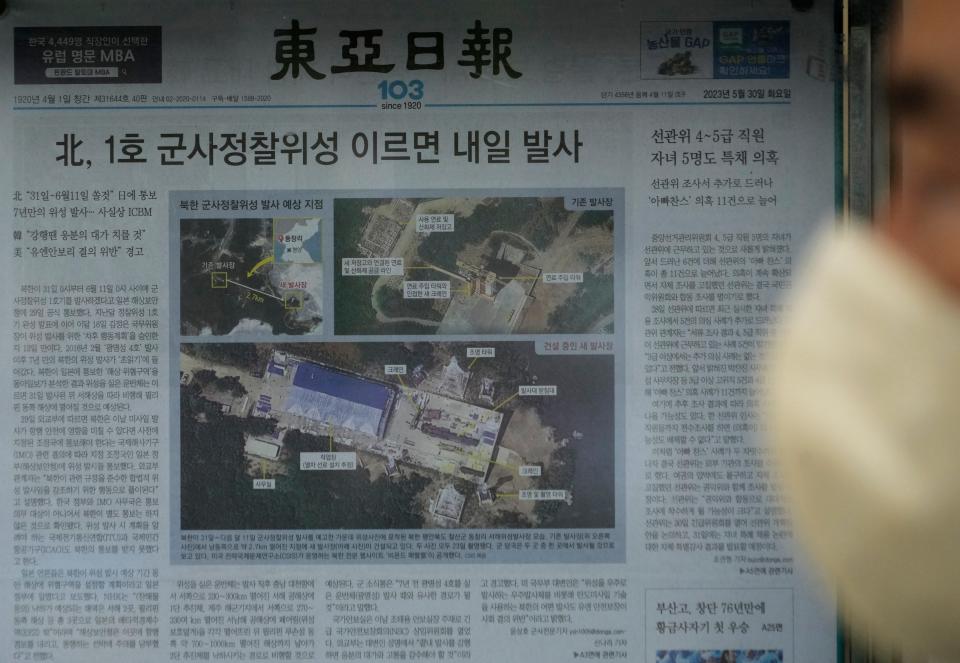North Korea vows second attempt after rocket carrying military spy satellite crashed into sea: Updates
- Oops!Something went wrong.Please try again later.
North Korea failed to launch the country’s first military spy satellite after a rocket carrying the satellite crashed into the sea, state media said Wednesday, pushing security tensions with the United States and South Korea.
The rocket carrying the satellite was launched about 6:30 a.m. from the northwestern Tongchang-ri area, where North Korea’s main space launch center is located, the South Korean Joint Chiefs of Staff said in a statement. South Korea’s military said the rocket had "an abnormal flight" before it fell into waters off the Korean Peninsula’s western coast.
A statement published in North Korean state media said the rocket lost thrust following the separation of its first and second stages, and the cause of the failure is being examined. An attempt at a second launch will be done as soon as possible.
Following the launch, the South Korean capital of Seoul issued alerts over public speakers and cellphone text messages telling residents to prepare for evacuation.
The Japanese government activated a missile warning system for its Okinawa prefecture in southwestern Japan, believed to be in the path of the rocket. Authorities later lifted the calls for evacuation. Japan’s Chief Cabinet Secretary Hirokazu Matsuno told reporters that no object was believed to have reached space.
South Korea's military said the incident only strengthened its military readiness with the United States.
North Korea's globally controversial plan to send its first military spy satellite was announced Tuesday. The government of North Korean leader Kim Jong Un notified the International Maritime Organization that the tentative launch window was between May 31 and June 11.
Developments:
∙ Pyongyang notified the IMO, which is responsible for maritime safety, to provide coordinates of areas where debris could fall. Any satellite launch would violate United Nations resolutions banning long-range missile tests by Pyongyang.
∙ North Korea claims the satellite is crucial to monitor joint U.S.-South Korean military exercises that have increased in recent months. North Korea describes the exercises as "reckless" invasion rehearsals.
∙ Washington and Seoul, saying the exercises are defensive, have expanded joint training since 2022 to cope with North Korea’s evolving threats.
∙ "The North Korea crisis, which has been in a state of hibernation for years, seems to be getting ready to explode again upon the world stage," Harry Kazianis, CEO of Rogue States Project and a senior editor at the national focused website 19FortyFive, told USA TODAY.

US State Department urges Pyongyang to reconsider
The U.S. State Department warned that the technology used to launch the satellite would be “identical to, and interchangeable with” ballistic missile technology. The U.N. Security Council has banned North Korea from nuclear weapons and ballistic missile testing since 2006.
“We urge the DPRK (North Korea) to refrain from further unlawful activity and call on Pyongyang to engage in serious and sustained diplomacy,” the statement reads.
Could North Korea fire a test missile into the ocean off California?
Kazianis said that it's clear Japan is committed to shooting down any missile or satellite that crosses its national boundaries and that Washington and Seoul probably would support Japan. It's important to be "clear-eyed" about how North Korea might respond, he said. Kazianis believes Pyongyang could then test a nuclear weapon − and send an intercontinental ballistic missile across the Pacific Ocean, possibly within a few hundred miles of the California coast.
North Korea seems determined to prove its military is powerful, he said, adding that Kim will never give up his nation's nuclear weapons.
"Pyongyang, thanks to decades of investments that total billions of dollars, is no military paper tiger but can raise tensions far beyond anything we saw" in previous years, Kazianis said. "And that could put us on the brink of a nuclear showdown."
Contributing: The Associated Press
This article originally appeared on USA TODAY: North Korea spy satellite: Rocket crashed into the sea after launch

